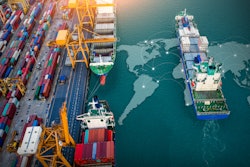TAIPEI, Taiwan (AP) -- Lavishly praised by Beijing, bitterly debated in Taipei and calmly accepted in Washington, this week's landmark trade deal between Taiwan and China is underscoring shifting relations between them and the United States.
The Economic Cooperation Framework Agreement, signed Tuesday, potentially eases one of East Asia's biggest flash points, the Taiwan-China split that dates from a civil war more than 60 years ago and still entangles the U.S., the island's defense guarantor. By slashing tariffs and offering preferential investment terms, the trade pact may bring Taiwan's and China's economies closer and pave the way for a formal end to hostilities.
But as Beijing and Taipei grow closer -- and China's global clout increases -- long-standing U.S. security ties with democratic Taiwan are coming under pressure.
"There are high-ranking people in the U.S. like senior retired military officers, who are speaking out against the relationship," said military analyst Alexander Huang of Taipei's Tamkang University. "The U.S. government assures us that they do not reflect official policy, but it is important to take them seriously."
For the moment, Washington is emphasizing the positive in the triangular relationship. The State Department applauded this week's trade deal as an improvement in Taiwan-China relations and hoped the trend would continue.
For Taiwanese President Ma Ying jeou, the trade agreement crowns a two-year-long effort to build a constructive relationship with longtime rival Beijing and end the prickly tensions stoked by Ma's predecessor, Chen Shui-bian, and his pro-independence line. Ma spokesman Lo Chih-chiang said better relations with China have strengthened Taiwan's ties with Washington. He points to a recent $6.4 billion sale of cutting-edge U.S. weaponry.
"During the Chen Shui-bian era the mutual trust between the U.S. and Taiwan was totally gone," Lo said. "Taiwan's relations with the U.S. got better only after President Ma Ying-jeou made efforts to improve cross-strait ties, as reflected in the progress in arms procurement."
But once Taiwan's partner in confronting communist-ruled China, Washington now seeks Beijing's help in confronting global problems -- the financial crisis, nuclear proliferation, climate change. That gives Beijing leverage. It has launched a lobbying effort in Washington to squelch the long-standing U.S. security relationship with Taiwan.
Ma's willingness to court Beijing has caused some to suggest that Taiwan may go the way of Finland, which during the Cold War took positions at odds with the West so as not to anger the neighboring Soviet Union and ensure its survival as an independent country.
Some of Ma's actions have fed the perception of a pro-Beijing tilt.
In April he told a television interviewer that "we will never ask Americans to fight for Taiwan," seemingly undermining Washington's policy of ambiguity on whether it would aid Taiwan if China attacked.
He has also ordered Taiwan's armed forces to shift priorities to disaster response and away from defending against a Chinese attack. Overall military spending has dropped slightly under Ma, to about 2.6 percent of the economy from 3 percent, according to Taiwan military analysts.
From trade ties to defense, Taiwan's opposition says Ma is weakening Taiwanese sovereignty and thereby increasing the chances the democratic island will eventually have to accept China's rule -- something few of them want.
At risk for some U.S. defense planners is American naval supremacy in the Western Pacific. Taiwan sits in the middle of the so-called first island chain that extends from Japan through the Philippines and that some analysts say is a bulwark against China's eastward maritime expansion toward key Pacific shipping lanes.
Should China and Taiwan grow so close that the island's territorial waters would fall under the Chinese naval control, "the ability of the U.S. navy to operate in that area of the Pacific would be constrained," said University of Miami China specialist June Teufel Dreyer.
Others contend that "Finlandization" would benefit the U.S.
Bud Cole, a China specialist at the National War College in Washington, said Taiwan's strategic value is overblown and that its absorption by China would not "significantly weaken the U.S. strategic position in Asia."
Taiwan-China reconciliation would also give Washington a reason to ditch arms sales to Taiwan and remove a major irritant in ties with Beijing.
In a sign that reasoning is making headway, Senate Intelligence Committee Chairwoman Diane Feinstein (D-California) in June called the most recent sale "a mistake." A retired admiral, William Owens, has also called for ending the sales, as have other retired military officers.
Former Pentagon official Thomas Mahnken believes reducing the sales would send the wrong signal to Japan and South Korea, long Washington's key partners in the Pacific. Still, he said, Washington's resistance may be waning.
"A key question is, how much longer will American political leaders be willing to take the Chinese pressure that comes with arms sales to Taiwan," Mahnken said. "I'm really not sure."















